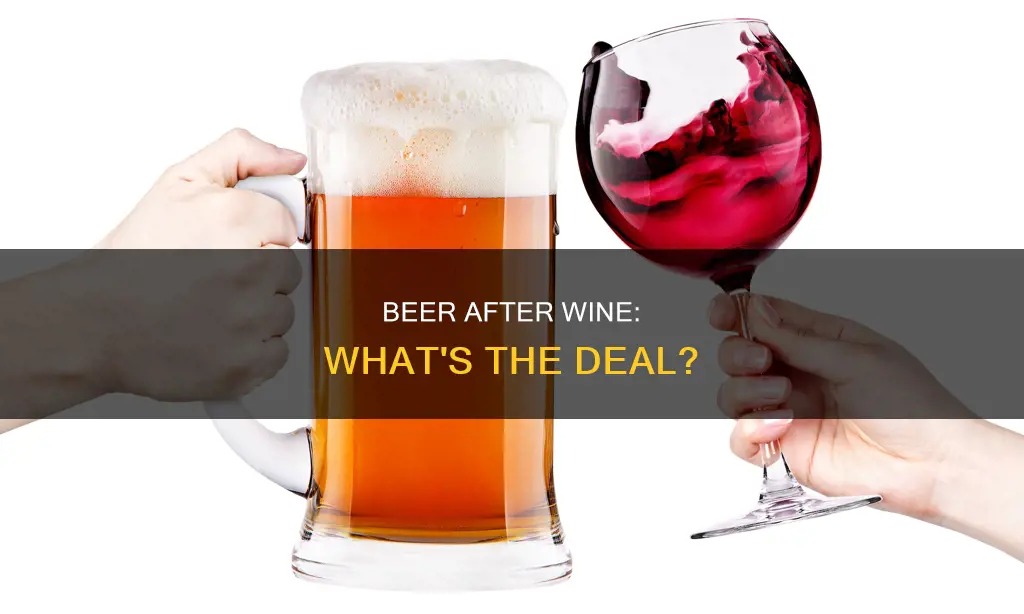
Drinking beer after wine is often said to be a bad idea. There are various reasons for this, including the belief that beer contains a lot of CO2, which causes the alcohol to go to your head faster, and that drinking lighter alcohols after stronger ones is unwise. However, a study by Cambridge University found that participants who drank two and a half pints of beer followed by four large glasses of wine reported just as bad a hangover as those who drank the wine first and then the beer. This suggests that the total amount of alcohol consumed is more important than the order in which drinks are consumed.
| Characteristics | Values |
|---|---|
| Is it okay to drink beer after wine? | Research suggests that the order of drinking beer and wine does not matter when it comes to hangovers. |
| Beer before wine | Some sources suggest that drinking beer before wine will not result in a hangover. |
| Wine before beer | Some sources suggest that drinking wine before beer will result in a worse hangover. |
| Amount of alcohol | The total amount of alcohol consumed has a much bigger effect on how you feel than the specific order of drinks. |
| Carbonation | Beer contains a lot of CO2, which causes the alcohol to "hit your head" faster. |
| Absorption rate | The absorption rate of alcohol is affected by the total amount of alcohol consumed and how fast it is absorbed. |
| Dehydration | Alcohol causes dehydration, which can lead to a headache the next day. |
| Acetaldehyde | Alcohol digestion produces a toxic chemical called acetaldehyde, which can make you feel unwell until it is metabolized. |
What You'll Learn

Beer before wine, you'll be fine
There is a popular saying that goes, "beer before wine and you'll feel fine; wine before beer and you'll feel queer." This implies that drinking beer before wine will not give you a hangover, but drinking wine before beer will. However, this saying has been debunked by researchers at Witten/Herdecke University in Germany and the University of Cambridge in the United Kingdom.
In their study, 90 participants aged 19 to 40 were split into three groups. The first group consumed 2.5 pints of cold lager beer followed by four large glasses of chilled white wine. The second group consumed the same amount of alcohol but in reverse. The third group, the "control group," drank only wine or beer. Throughout the experiment, participants answered questions about their well-being and ranked their level of drunkenness on a scale of 1 to 10. They were then given water and sent to bed at the study facility, where researchers supervised them as they slept. The next morning, participants were asked about any hangover symptoms, which they ranked on the Acute Hangover Scale. After a week, the experiment was repeated, with the first and second groups swapping drink orders and the third group switching their drink.
The researchers found no significant differences in hangover scores among the three groups. This indicates that the order of drinking beer and wine does not affect the severity of a hangover. Jöran Köchling, the study's first author, concluded that "the truth is that drinking too much of any alcoholic drink is likely to result in a hangover."
So, while the saying "beer before wine, you'll be fine" may not be accurate in terms of hangover prevention, it is still important to drink responsibly and in moderation. The amount of alcohol consumed and individual factors such as age, sex, body weight, and drinking habits are more predictive of hangover intensity than the order of drinks.
Beer Drinking and DTS: A Deadly Mix?
You may want to see also

Wine before beer, you'll feel queer
"Wine before beer, you'll feel queer" is an age-old saying that refers to the order in which alcoholic drinks are consumed and the potential impact on the drinker's well-being, specifically the severity of a hangover. The saying suggests that drinking wine before beer will result in unpleasant consequences, such as feeling unwell or experiencing a severe hangover. However, scientific research has questioned the validity of this adage.
The origin of the saying can be traced back to cultural and social differences in drinking preferences. Historically, beer was associated with the working class or poor, while wine was considered a drink for the wealthy or upper class. Therefore, the saying could reflect a change in social status, indicating that transitioning from drinking beer to wine signifies an improvement in one's life, while the reverse suggests a decline. This interpretation is supported by variations of the saying in different languages and cultures, such as the German saying, "Wein auf Bier, das rat' ich Dir -- Bier auf Wein, das lass' sein," which translates to "Wine after beer, I recommend; beer after wine, leave it."
Another explanation for the saying relates to the carbonation and alcohol content of the drinks. Beer is typically carbonated, and drinking it after wine is believed to stimulate the pyloric sphincter muscle, regulating the flow of liquids from the stomach into the intestine. This could result in faster absorption of alcohol from both drinks, potentially leading to increased intoxication and a worse hangover. However, this theory has been challenged by scientific studies.
Recent studies by researchers at Witten/Herdecke University in Germany and the University of Cambridge in the UK set out to scientifically evaluate the impact of drink order on hangover severity. The studies involved participants consuming different orders of beer and wine, with controlled amounts of alcohol, and assessing their well-being, drunkenness, and hangover symptoms. Surprisingly, the results showed no significant difference in hangover scores between the groups, regardless of the order in which they drank beer and wine. The studies concluded that drinking too much alcohol, regardless of the type or order, is the main factor contributing to hangovers. Individual factors such as age, sex, body weight, and drinking habits did not appear to predict hangover intensity. Instead, vomiting and perceived drunkenness were found to be better indicators of a severe hangover.
While the saying "wine before beer, you'll feel queer" has persisted for a long time, scientific evidence suggests that it may not hold true. The studies provide valuable insights into the effects of alcohol consumption and challenge long-held beliefs about hangover prevention. However, it is important to remember that excessive alcohol consumption can have negative consequences, and drinking responsibly and in moderation is always advised.
Beer and Oral Thrush: Is There a Connection?
You may want to see also

Total amount of alcohol consumed
The total amount of alcohol consumed is a critical factor in determining the severity of a hangover. The adage "beer before wine and you'll feel fine" has been debunked by research, which found that the order of drinks did not influence hangover symptoms. Instead, the amount of alcohol consumed, regardless of the type of drink, is the main predictor of a hangover.
The total amount of alcohol consumed is measured by the alcohol by volume (ABV) percentage on drink labels. A standard drink in the US contains about 14 grams of pure alcohol. For instance, 12 ounces of regular beer has an ABV of 5%, while 5 ounces of wine has an ABV of 12%.
The amount of alcohol consumed can vary based on demographic characteristics. For example, in the US, 63% of men drank alcoholic beverages compared to 57% of women, and 70% of those aged 35-54 consumed alcohol compared to younger and older adults.
It's important to note that alcohol consumption, especially in excess, is linked to negative outcomes such as health risks, crime, and road incidents. Therefore, it's crucial to drink responsibly and in moderation to avoid these adverse effects.
Beer Drinking on Atlantic Beach, NC: What's Allowed?
You may want to see also

Rate of alcohol consumption
The rate of alcohol consumption varies from person to person and depends on several factors, including gender, age, body weight, and drinking habits. While the order of consumption may not significantly impact the severity of hangovers, as per a study by Witten/Herdecke University in Germany and the University of Cambridge in the UK, the amount of alcohol consumed is the crucial factor.
According to the National Institute on Alcohol Abuse and Alcoholism (NIAAA), moderate drinking for adults involves limiting intake to two drinks or less per day for men and one drink or less per day for women. Binge drinking, on the other hand, is defined as consuming enough alcohol to bring the blood alcohol concentration (BAC) to 0.08 percent or higher. For men, this typically means five or more drinks, while for women, it's four or more drinks, all consumed within about two hours. Heavy drinking is defined as consuming five or more drinks on any day or 15 or more per week for men, and four or more drinks on any day or eight or more drinks per week for women.
It's important to note that alcohol consumption, especially in excess, is linked to negative outcomes such as health issues, crime, road incidents, and alcohol dependence. Therefore, it's crucial to drink responsibly, never drive under the influence, and know your limits.
Australian Beer: Is Fosters Really Their Brew of Choice?
You may want to see also

Dehydration
Drinking beer after wine is unlikely to affect your level of dehydration compared to drinking them in the opposite order. Research has found that the order in which you drink alcohol does not matter when it comes to hangovers. The severity of a hangover is influenced by how drunk you feel and whether you vomit after drinking, rather than the type or order of drinks consumed.
However, it is important to note that alcohol consumption in general can lead to dehydration. Alcohol is a diuretic, which means it causes your body to remove fluids more quickly through urination. This is because alcohol inhibits the release of an anti-diuretic hormone called vasopressin, which normally reduces the need to urinate. As a result, drinking alcohol can make it harder for your body to retain fluids.
To minimise the risk of dehydration, it is recommended to eat plenty of food and drink water before consuming alcohol. Drinking on an empty stomach can lead to faster absorption of alcohol into the bloodstream, resulting in increased dehydration. It is also suggested to limit the amount of alcohol consumed, stick to lighter-coloured drinks, and choose beverages with lower alcohol content. Dark-coloured drinks such as red wine, whiskey, and brandy contain congeners, which are chemicals that can enhance colour, taste, and flavour, but also contribute to dehydration.
Additionally, alternating between water and alcoholic drinks can help prevent dehydration. Drinking water before going to sleep can also help to rehydrate the body and reduce any hangover effects.
Beer Drinking: Better Breathing or Just a Myth?
You may want to see also
Frequently asked questions
According to a study by Cambridge University, drinking beer after wine will result in a hangover just as bad as drinking wine after beer. So, it is not advisable to drink beer after wine.
Beer contains a lot of CO2, and CO2 causes the alcohol to go to your head much faster. It is not a good idea to drink any high-CO2 drink after drinking wine or stronger alcohols.
The total amount of alcohol consumed and how fast the alcohol is absorbed are the two most important factors in determining the severity of a hangover. Therefore, it is recommended to pace yourself and drink in moderation.







